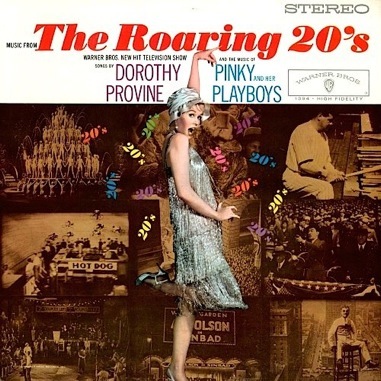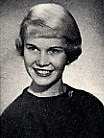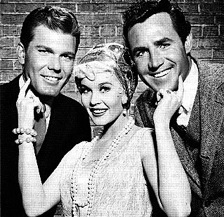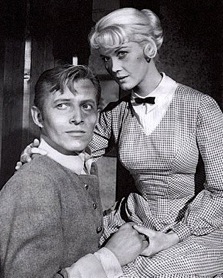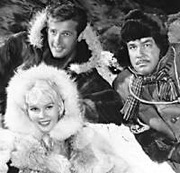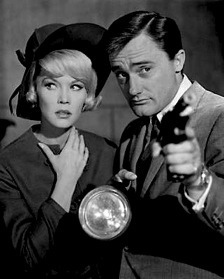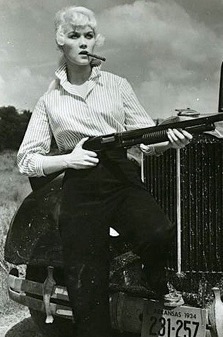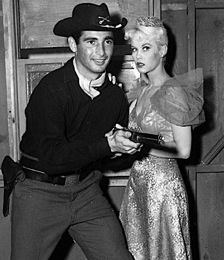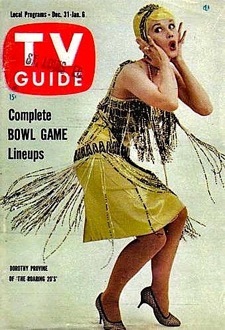Dorothy Provine
d. April 25, 2010
Dorothy Provine, 75, blonde comic actress and singer who cut a sparkling swath through 1960s television and movies in a relatively short career, died April 25 at a hospice near her home in Bremerton, Wash. She had emphysema.
Provine was born in Deadwood, S.D., grew up in San Francisco and Seattle, and studied drama at the University of Washington. She dropped out after she got a job handing out prizes on a local TV quiz show and then decided to head for Hollywood. She reportedly landed a good agent and the title role in "The Bonnie Parker Story" three days after her arrival in the movie capital in 1957.
A flurry of film and television roles followed, including "The 30 Foot Bride of Candy Rock," a sci-fi comedy with Provine as the gargantuan fiancee of Lou Costello (in his last role and only film without partner Bud Abbott). She appeared in episodes of The Millionaire, Alfred Hitchcock Presents, Wagon Train, The Bob Cummings Show, Mike Hammer, The Rough Riders, The Texan, The Real McCoys, and such Warner Bros. series as Lawman, Cheyenne, Sugarfoot, Colt .45 and 77 Sunset Strip before Warners put her under contract and into its new series The Alaskans. Roger Moore starred as a fast-talking fortune hunter in the 1898 Alaskan gold rush, Jeff York played his brawny partner, and Provine appeared as a saloon singer named Rocky Shaw.
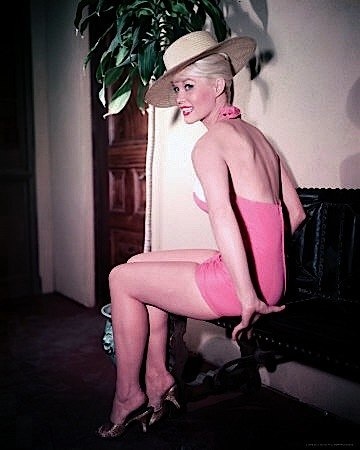
The Alaskans barely made it through ABC's 1959-60 season, and the studio immediately moved Moore into Maverick. Provine was cast in another new series, The Roaring 20's, with Rex Reason and Donald May top-billed as Prohibition-era New York newspaper reporters. But it was Provine as Pinky Pinkham, owner and star attraction of a swanky speakeasy, who grabbed the spotlight. The role again showed off her song and dance talents, this time to far more acclaim. The series was a hit in its first season and UPI TV columnist Rick Du Brow proclaimed Provine "TV's It girl," while Time noted "It is Dorothy's oooohing and shimmying that have kept the series afloat." She made the cover of TV Guide twice during the show's 15 months on the air.
Provine said she wanted the role so badly that she'd "go home and pray," she told Du Brow. "When the studio was looking for the girl for the flapper part and asked me if I could dance, I said, yeah. I worked like a dog at home getting the Charleston as fast and frantic as I could. The secret is that I put on 33 rpm records at 78 rpm speed."
Warner Bros. released a Roaring 20's album with Provine singing period songs, and she soon was making variety-show appearances with Perry Como, Dean Martin, Garry Moore, Red Skelton, Bob Hope, The Hollywood Palace and others. But The Roaring 20's was canceled in the middle of its second season and Provine returned to guest shots in Warners series such as Hawaiian Eye and The Gallant Men. The studio rarely used her in its own films but lent her out for roles in the all-star 1963 comedy "It's a Mad Mad Mad Mad World," as the wife of Milton Berle and daughter of Ethel Merman, and as Jack Lemmon's wife in the 1964 Columbia comedy "Good Neighbor Sam."
George Burns was impressed by her talent and looks, using her in his nightclub act as one of a number of comic foils such as Connie Stevens and Carol Channing that he employed after Gracie Allen retired. Provine played Las Vegas with Burns in the summer of 1963.
Her last Warner Bros. contract role was one of many supporting parts in Blake Edwards' overblown 1965 comedy "The Great Race," starring Lemmon, Tony Curtis and Natalie Wood. Provine performed a raucous song-and-dance number, "He Shouldn't-a Hadn't-a Ought'n-a Swang on Me," written for the film by Johnny Mercer and Henry Mancini.
Free of her contract, Provine appeared with Bob Newhart in a comical episode of Bob Hope Presents the Chrysler Theatre, and landed a guest shot in an atypically lighthearted episode of Dr. Kildare, playing a nurse who's desperate to appear in the hospital variety show that Kildare has been stuck with producing. Provine and series star Richard Chamberlain sang "How About You?" in the show.
That role led Kildare producer David Victor to cast her in the two-part story that opened the second season of The Man From U.N.C.L.E. in September 1965. In "The Alexander the Greater Affair," Provine played the flighty, estranged wife of a would-be world conqueror portrayed by Rip Torn. The show also was re-cut and released as the third U.N.C.L.E. feature film, "One Spy Too Many." It opened in London in January 1966 and played throughout the world, becoming one of the most popular and successful of the U.N.C.L.E. movies, although it did less well in the United States, where it was released in September 1966.
She appeared in another 1966 low-budget spy caper, "Kiss the Girls and Make Them Die," a Dino de Laurentiis production released in the U.S. in January 1967. Mike Connors played the secret agent battling the typical super-villain (Italian film star Raf Vallone) with the help of British agent Provine and her chauffeur Terry-Thomas.
Her other films included "That Darn Cat" with Hayley Mills, Dean Jones, Roddy McDowall and Elsa Lanchester, "Who's Minding the Mint?" with Jim Hutton, Milton Berle, Joey Bishop and Victor Buono, and "Never a Dull Moment" with Dick Van Dyke, Edward G. Robinson, Slim Pickens and Joanna Moore. Jones described her to the Los Angeles Times as "a very underrated actress. She did everything, really. But she was mainly a comedienne and a very funny gal, and you knew in a scene that she was not going to drop the ball."
In 1968, Provine appeared on the NBC anthology The Danny Thomas Hour in "My Pal Tony," an episode that served as the pilot for Sheldon Leonard's short-lived series My Friend Tony, and in the TV-movie "The Sound of Anger," the pilot for the lawyers segments of The Bold Ones. She then married British director Robert Day and soon vanished from public view.
Day helmed several Tarzan movies and episodes of such British series as Robin Hood, Danger Man and The Avengers before moving to Hollywood in 1967, where he continued to direct episodic TV for many years. He met Provine when she appeared in a 1968 episode of The FBI that he directed. They married in 1969 and "when we got married, she wasn't really interested in acting or being in the movies anymore," Day told the Los Angeles Times. "She was a homebody, very much so." After their marriage, Provine appeared only in an early segment of Love American Style and in a 1973 episode of Police Story that Day directed. They moved to Bainbridge Island, Wash., in 1981.
